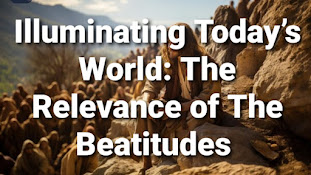Illuminating Today’s World: The Relevance of The Beatitudes
As Christians navigate through the often tumultuous journey of life, we continually seek wisdom from the divine text that has shaped our faith for centuries: The Holy Bible. There are many lessons nestled within its profound passages, but for the sake of today's discussion, our focus shifts to the remarkable teachings encapsulated within the Beatitudes. Presented within the Sermon on the Mount by Jesus himself, the Beatitudes portray the eight blessings that echo virtues of humility, righteousness, mercy, purity, peace, and spiritual devotion. Although the Beatitudes originated over two millennia ago, their relevance remains unwavering in today’s world. Amid the incessant distractions of today's fast-paced, technology-infused era, the Beatitudes prompt us to re-evaluate our core values, personal attitudes, and responses to societal concerns.In a world divided by wealth inequality, racial tensions, political polarisation, and escalating violence, the Beatitudes enlighten us about genuine virtues, nurturing compassion and resilience, and challenging the superficial and materialistic measurements of success.
Let's delve into the modern relevance of these eight teachings:
1. Blessed are the poor in spirit, for theirs is the kingdom of heaven.
Today's world demands high standards in education, employment, and wealth accumulation. These societal pressures often leave individuals feeling spiritually poor, consumed with anxieties, fears, and depression. Embracing the 'poor in spirit' Beatitude can remind us that faith offers hope beyond our earthly troubles.
2. Blessed are they who mourn, for they shall be comforted.
In a culture that avoids discussions about death, grief, and suffering, this Beatitude emphasizes that mourning is a human process that invites divine consolation and support
3. Blessed are the meek, for they shall inherit the earth. Humility and meekness are not often celebrated virtues in a society that promotes self-promotion and assertiveness. Yet, they are qualities that can inspire others, dissolve ego-based conflicts, and promote peaceful coexistence.
4. Blessed are they who hunger and thirst for righteousness, for they shall be satisfied. With global outcry for social justice, gender equality, and climate action, this Beatitude encourages those who passionately seek fairness and righteousness.
5. Blessed are the merciful, for they will be shown mercy. In an age where trolling, criticism, and cancel culture are rampant, the importance of mercy becomes even more salient. As this Beatitude instructs, mercy sown is mercy reaped.
6. Blessed are the pure in heart, for they will see God. The essence of this Beatitude echoes in our fight against corruption, deceit, and malice. Striving for purity of heart nurtures trust and integrity in personal relationships and wider societal interactions.
7. Blessed are the peacemakers, for they will be called children of God. As nations struggle with war, terrorism, and racial tension, this Beatitude underscores the necessity of peacemaking initiatives that help cultivate unity and global brotherhood.
8. Blessed are those who are persecuted for righteousness’ sake, for theirs is the kingdom of heaven.
Persecution for righteous causes has increased, seen in the relentless defenders of human rights, freedom of speech, and religious liberty. This Beatitude bolsters those standing strong for moral justice in the face of adversity.
As we comprehend the significance of the Beatitudes in the present world, we find a divine roadmap leading us towards fulfilling our role as stewards of earth. By embracing these teachings, we can participate in the global transformation toward peace, unity, and love that mirrors the kingdom of God.
Remember, The Beatitudes serve as a testament to our spiritual potential and an enduring source of strength, enlightenment, and hope in our modern era. Embracing them allows us to engage more compassionately and meaningfully with today’s world




Comments
Post a Comment